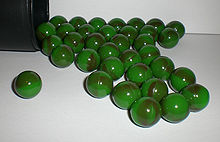Paintball
Paintball is a sport in which players try to eliminate opponents by shooting each other with balls of coloured dye. The players can compete either in teams or individually.[1][2][3] The balls of dye (called "paintballs") are shot through a device called a paintball marker (or paintball gun). When the paintballs hit, they release the dye. When they hit a player, the dye marks that player as eliminated. The game is often played as an organised competitive sport, involving leagues, tournaments, and professional teams.[4]



Paintball can be played indoors or outdoors, on fields specifically made for the game. The field is scattered with natural or artificial obstacles and terrain, which players use to hide behind. The objective can vary according to the type of game being played. Players may have to capture a flag held by the opposing team, defend or capture a particular point on the field, or simply eliminate all other players on the field until they are the only player or team remaining. Depending on the variant played, games can last from seconds to hours.
In many countries, paintball is regulated by specific laws. Players are usually required to wear protective gear (such as masks), and game rules are strictly enforced. Paintball is also used by military forces and law enforcement for training recruits.
Terrain
changeThe playing field is scattered with several obstacles. These are used to block the view of opponents and prevent them from firing accurately. They may be a shelter, fallen tree, barrels, or a cylindrical tube. In most modern speedball tournaments, inflatable vinyl objects of different shapes and sizes are used.
Variations
change- Scenario paintball - Scenario paintball games strive to be the most realistic paintball games you can play. Scenario paintball games are usually based on a story line such as the Battles of Normandy or Iwo Jima, however they are not all limited to World War II. Some go into the realm of Sci-Fi and play out an alien invasion. In nearly every Scenario game there are props, character players, paintball grenades, smoke bombs and sometimes vehicles and bodies of water as well. Scenario Paintball is very similar to big Airsoft games. Scenario games also last much longer than the other types of paintball games, usually lasting anywhere from 12 hours to several days.
- Capture the Flag - There are two variations of this type: Normal two flag, and center flag. In the normal two flag type game, each team has a flag on opposite sides of the field. The objective is to capture the opposing team's flag and return it to your base. Center flag is where there is a single flag in the center of the field. The objective is to get the flag and take it to the far side of the field.
- Defend the Castle - This is again a two-team based paintball game and is not very common one. One team being inferior in numbers has to defend a Castle/ building while other with superior numbers has to conquer it. The desired objective of the game is met when the attackers enter the castle or die trying. It involves the combination of Paintball skills as well as the strategic planning at the same time.
- Elimination - The objective is to simply eliminate everyone else on the other team. Games typically last from 15-20 minutes. Big games, however, can last hours. Most big games have rejuvenation every half hour or so, so if you get out in the first 10 minutes, you're not sitting on the sidelines for two hours.
References
change- ↑ "Defined by the OXFORD ENGLISH DICTIONARY as a "war game"". Stony Brook University Libraries. Retrieved December 27, 2009. (subscription required)
- ↑ "Game as defined by dictionary.com". Dictionary.com (Dictionary of the English Language, Fourth Edition). Houghton Mifflin Company. 2004. Retrieved December 27, 2009.
- ↑ "Merriam-Webster Online Dictionary". Merriam-Webster Online. 2010. Retrieved December 27, 2009.
- ↑ Greenberg, Karl (September 11, 2009). "Sporting Goods Group Dissects Team Sports". MediaPost Communications. Archived from the original on July 14, 2011. Retrieved September 12, 2009.
Other websites
change- Paintball at the Open Directory Project